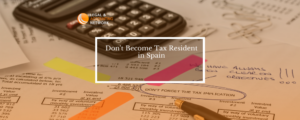STEPS PRIOR TO BUYING AND SELLING A PROPERTY
The first thing that one needs to do when attempting to purchase a Spanish property is to apply for a NIE number. NIE stands in Spanish for foreigners’ identification number.
The NIE number is applied for at a local National Police Station.
This number will allow the buyer to pay for the taxes involved in the purchase, register the property at the land registry and register to pay local taxes.
Normally the main step, although not obligatory, is to prepare a private purchase contract (PPC) between the seller and the buyer, it is not necessary to register it but it is obligatory to comply with the terms of the contract. At the signing of this contract it is also usual to deliver a 10% deposit of the final price.
In this contract it will be outlined how the purchase expenses are divided. Normally the buyer pays all expenses, such as transfer tax, notary and lad registry fees. The seller should the Plusvalia tax.
The plusvalía tax is a levied by the town hall and it is a percentage of the increase of the value of the urban land. This tax is sold only if there is a profit on the sale. If the property is sold below the acquisition price, then there is no Plusvalia tax payable.
One should check the title of the property. This is done by requesting a “nota simple” form the land registry wherein the property is registered.
The nota simple will indicate who is the owner, if there are any charges, such as a mortgage or any other “embargoes”, such as unpaid community fees or taxes.
It is also important, specially for villas, to request a certificate of no urban infraction from the Town Hall. This certificate will state if there has been any infringement of the zoning laws and or demolition orders..
In order not end up paying the last 3 years’ worth of outstanding community fees, it is recommended to request a certificate of no debt from the community of owners.
Please ask for a copy of the community’s by laws in order to see if there are any short term rental limitation and the last minutes of the community, in order to be aware if there is any extra community quota to be paid.
THE SIGNATURE OF THE DEED OF SALE
If one wants for the purchase deed to be registered at the local land registry, one must attend a notary and grant a purchase deed.
By registering the deed at the land registry it shows who the owner is and protects the ownership against any potential charges levied against any of the previous owners..
At the notary, in order to sign for the purchase deed, it will be necessary to provide the following documentation:
– Copy of the buyer’s and seller’s identifications.
– Depending on whether you are buying or selling, the title deed or the nota simple.
– Certificate of energy efficiency.
– License of first occupation, if any.
– Certificate of no debt from the community of owners stating that there is no outstanding debt at the signature date.
– Bank checks, if any.
– Last IBI tax and Garbage collection stamp duty paid receipts, in order to corroborate that it is up to date and also to verify the cadastral reference.
At the notary’s appointment, the seller and buyer’s identifications are checked. The notary will read the main clauses of deed out loud and check the different documents that are part of the transaction, such as copies of the cheques, etc. He will also check how the expenses are paid and reiterate the legal and fiscal obligations of each party.
STEPS AFTER SIGNING
After the deed has been granted, the buyer’s obligations are as follows:
– Pay the corresponding transfer tax return.
– Submit the deed to the Land Registry wherein the property is located.
– Change the titleholder of the electricity, water, IBI tax and garbage collection stamp duty. Notify the community of the change of ownership.
EXPENSES ARISING FROM THE SALE AND PURCHASE
– Notary fees: These expenses are regulated by the Government and therefore will be the same for all notaries.
– Registration fees: These are also set by the Government by means of a tariff and are identical for all registries. Generally at the time of registration it is necessary to leave a provision of funds.
– Lawyer/administration fees: Each party pays its own legal costs.
– Plusvalía: Generally well as it has been commented previously it is usually paid by the seller and it is possible to make a previous estimation of the amount to pay online.
TAXES
Transfer tax: If the property is second hand you will have to pay the Transfer Tax and in Andalusia it is 7%. Deadline of 2 months for its presentation from the day after the deed.
- IVA: If the property is a new construction it has a tax rate of 10% on the sale price. If it is another type of property, the IVA is 21%.
- Stamp Duty: If it is a newly constructed property, in addition to VAT, the tax on Documented Legal Acts (AJD), whose rate in Andalusia is 1.2%, must be paid. Deadline of 2 months for its presentation from the day after the deed.
- Capital Gains tax: Depending on the seller’s profit it can be up to 28%.
Non-resident capital gains tax, the buyer must withhold 3% of the sale price and pay it to the tax office within one month from the day following the signing of the deed, if the seller is a non-resident via tax return 211. - Model 210 of sale for non-residents: The non-resident individual who sells a property in Spain must submit the return within 4 months from the date of granting the deed.
- Annual Form 210 for non-residents: For the simple fact of having a property in Spain, you will have to pay for this annual tax “deemed income”, according to the cadastral value of the property. Depending on whether the cadastral value is revised or not, it will be multiplied by 1.1% or 2% and depending on whether it is European or from a non-EU country, it will be taxed at 19% or 24% respectively.
- Form 210 if you rent the property here. If you also rent your property you will have to present this tax on a quarterly basis for the income received from the rental. If it is European you will be able to deduct the expenses and if it is not, you will not be able to.
- IBI: Real Estate Tax, it is a local tax that is issued annually by the town halls.







